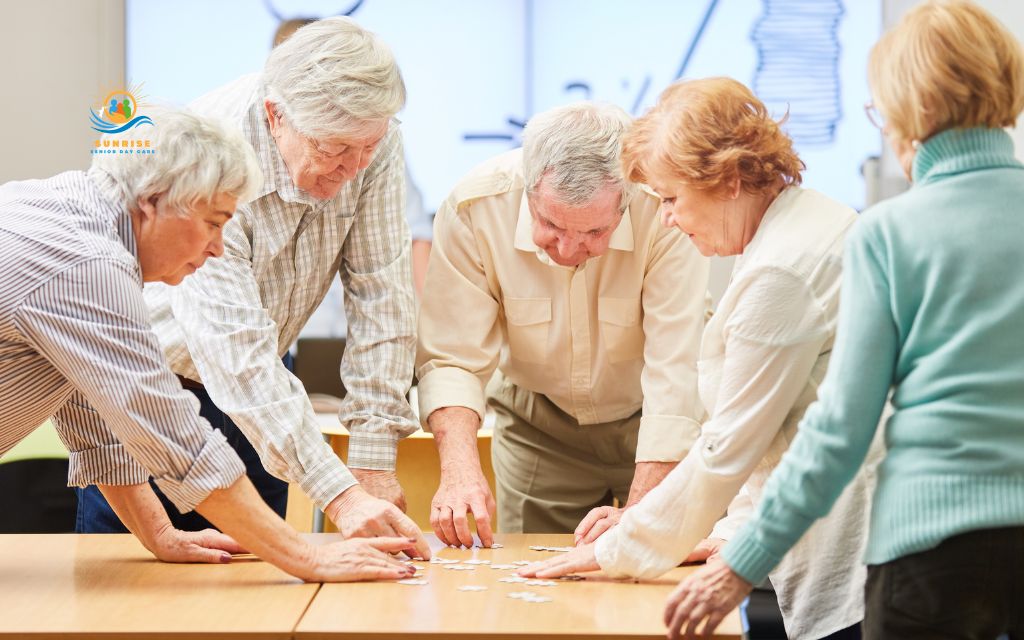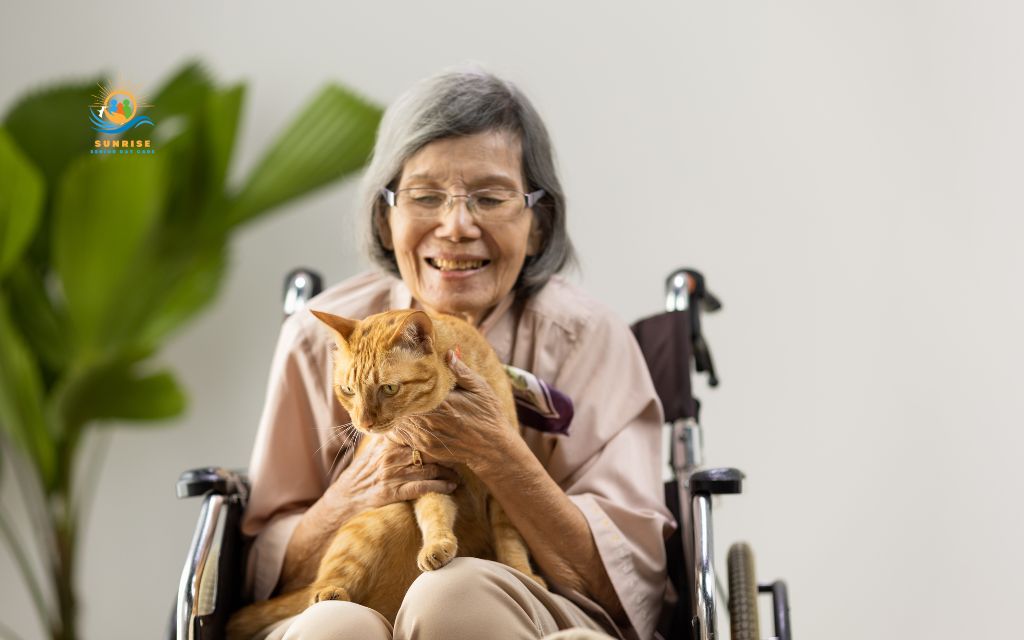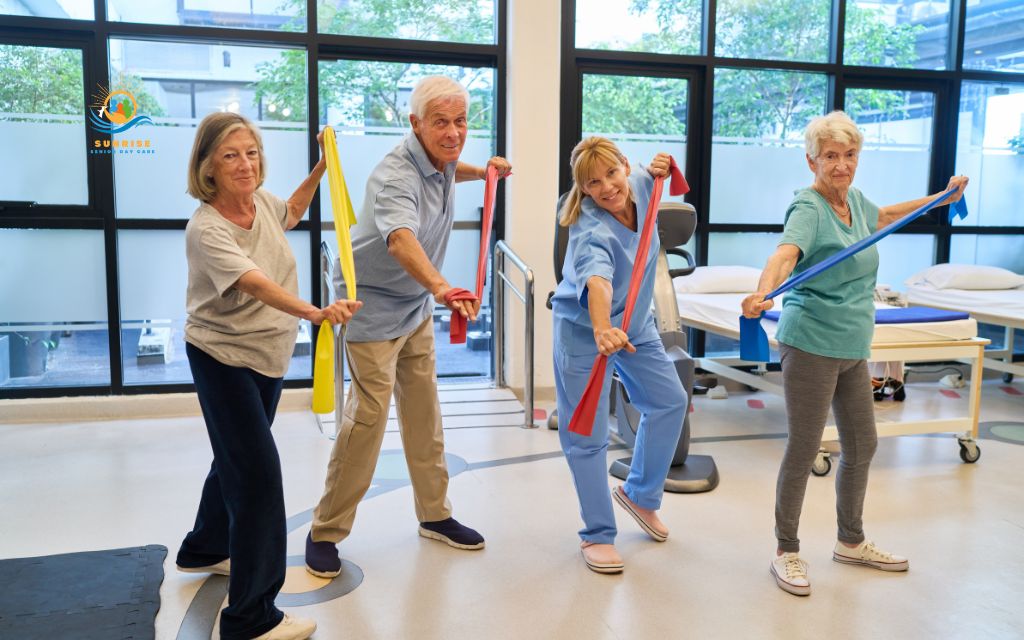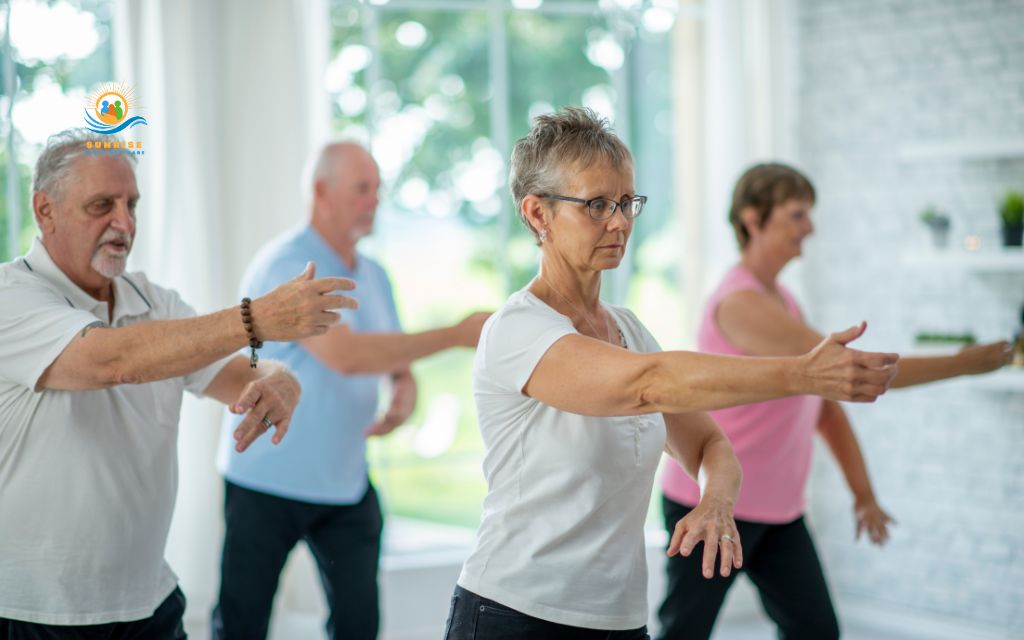If you’re caring for an aging parent, you know the weight of worry that comes with each morning. Will they be safe today? Will they feel lonely? Are they getting enough stimulation to keep their mind sharp and their spirits lifted?
These concerns keep many adult children awake at night. But here’s something that can ease that burden: structured adult day programs offer more than just supervision. They create purposeful days filled with connection, movement, and joy while giving you the peace of mind to focus on work and family, knowing your loved one is thriving.
ere are 25-day program activities examples of engaging, wellness-focused offerings in Denver’s top day programs – the kind that transform empty hours into meaningful experiences.

What are day program activities?
Day program activities are structured, supervised sessions designed to promote physical, mental, emotional, and social wellness for older adults attending adult day care centers. Think of them as purposeful experiences, not time-fillers. Adult day experiences focus on engagement, cognitive stimulation, and social connection – 3 pillars that help seniors maintain quality of life.
Why activities matter in social day programs
Research shows that meaningful daily structure can dramatically improve outcomes for older adults:
- Reduces cognitive decline and depression: Regular mental stimulation through puzzles, games, and social interaction helps maintain cognitive function and emotional wellbeing.
- Supports mobility and balance: Physical activities tailored to senior abilities prevent falls, maintain strength, and preserve independence longer.
- Builds friendships and reduces isolation: Social day programs combat the loneliness epidemic affecting older adults, creating genuine connections that extend beyond program hours.
- Offers routine and predictability: Especially important for those with memory concerns, structured days provide comfort and security through familiar patterns.
For families using elder day care services, this means your loved one isn’t just “attending” a program – they’re actively participating in experiences that preserve cognitive function, physical health, and emotional resilience.
25 engaging day program activities examples
Let’s explore the diverse activities that make each day at adult day programs meaningful and enriching.
Physical wellness & mobility
Physical activity is gentle, adaptive, and designed to meet participants where they are:
- Chair yoga and balance training help seniors improve flexibility and stability without risk of falling. Participants remain seated or use chairs for support and follow certified instructors through gentle stretches.
- Tai Chi for seniors incorporates slow, flowing movements that enhance coordination and inner calm. Many programs offer morning Tai Chi sessions that set a peaceful tone for the day.
- Walking clubs take advantage of Colorado’s beautiful weather. Groups might stroll around safe outdoor spaces or enjoy indoor walking programs during colder months.
- Light strength training with resistance bands maintains muscle tone and bone density. Staff adapt exercises to individual abilities, ensuring everyone feels capable and successful.
- Dance therapy or rhythmic movement classes combine physical activity with joy. Whether it’s gentle swaying to big band music or seated dance routines, movement becomes celebration.

Cognitive & memory stimulation
Keeping minds sharp is a cornerstone of quality adult day experiences. Programs incorporate varied cognitive activities that challenge without frustrating:
- Brain games and trivia challenges tap into seniors’ wealth of knowledge. Teams compete in friendly competitions covering history, geography, and pop culture from their younger years.
- “Name That Tune” or music recall sessions leverage music’s powerful connection to memory. Even participants with dementia often light up when familiar melodies play.
- Reminiscence therapy using photos and storytelling validates life experiences and stimulates memory recall. Sharing stories from their past helps participants feel valued and understood.
- Word puzzles, crosswords, and Sudoku provide individual cognitive exercise tailored to skill levels. Staff circulate to offer hints and encouragement.
- Cognitive therapy through digital tablets or memory boards incorporates modern technology. Interactive apps and games provide engaging mental workouts.

Creative expression
Creativity doesn’t retire. Programs for happy living and wellness adult daycare emphasize artistic pursuits that let personalities shine:
- Watercolor painting or ceramics workshops offer sensory experiences and visible accomplishments. Participants take pride in creating gifts for grandchildren or decorating their own spaces.
- Craft-making for holidays and birthdays brings seasonal joy. From Valentine’s cards to Halloween decorations, creative projects mark time and create anticipation.
- Floral arranging or seed planting connects seniors to nature’s beauty. Spring planting projects at park adult day programs give participants something to nurture and watch grow.
- Cooking and baking classes engage multiple senses while creating delicious results. The aroma of fresh cookies or homemade bread makes any facility feel like home.
- Drama or improv sessions encourage playfulness and spontaneity. Even shy participants often surprise themselves by joining theatrical games that spark laughter.

Social connection & community
Humans are wired for connection. Adult day programs intentionally create opportunities for meaningful relationships:
- Group luncheons and birthday celebrations transform meals into social events.
- Intergenerational visits from schools or volunteers bring energy and purpose. Seniors mentor young people, share wisdom, and feel valued by younger generations.
- Themed events or cultural festivals honor participants’ interests and heritage. Celebrating diverse backgrounds creates an inclusive community.
- Pet therapy sessions provide unconditional affection and stress relief. Visits from trained therapy dogs often become the week’s most anticipated activity.
- Local outings to museums, gardens, or markets connect participants to broader Denver community life. Field trips to the botanic gardens or local farmers’ markets provide fresh experiences and conversation topics.

Emotional & spiritual wellness
Inner peace matters as much as physical health. Quality programs address the whole person:
- Meditation and guided relaxation help manage stress and anxiety. Brief mindfulness sessions between activities create calm transitions.
- Gratitude circles invite participants to share daily blessings. This simple practice shifts focus toward positivity and abundance.
- Gentle faith-based reflection sessions (optional and non-denominational) honor spiritual needs without imposing beliefs. Programs respect diverse faith traditions.
- Support groups or talk circles create safe spaces for sharing challenges. Peer support reduces feelings of isolation around common struggles like chronic pain or grief.
- Mindfulness and breathing exercises provide tools participants can use at home. Learning to manage emotions through breath builds lasting coping skills.

Specialized activities for dementia & memory care
Dementia day care activities deserve special attention because they’re tailored specifically to cognitive ability and emotional needs rather than chronological age. Day care for dementia patients recognizes that traditional activities may need modification to remain engaging and confidence-building.
Programs serving those with memory concerns emphasize:
- Music therapy and sensory boxes that stimulate memory through familiar songs and textured objects. Music often reaches people even when words fail.
- Simple cooking or folding tasks for confidence that provide a sense of accomplishment. Folding napkins or stirring ingredients feels purposeful and familiar.
- Reminiscence scrapbooks filled with photos from participants’ younger years. Visual prompts help unlock memories and facilitate conversation.
- Animal-assisted therapy offers comfort without demanding complex interaction. Petting a calm dog requires no words but provides genuine connection.
- “Memory walks” through halls decorated with calming scents and visual cues. Lavender sachets and familiar photographs create orientation points throughout the space.
How programs personalize activities
Every senior’s interests and abilities are unique. Quality adult day programs recognize this diversity and customize accordingly.
Here’s how personalization typically works:
- Individual assessments during enrollment gather detailed information about physical abilities, cognitive status, interests, and personal history. Staff learn whether your mother loves gardening or your father was a veteran who’d appreciate military history discussions.
- Activity preferences surveys let participants (and families) indicate favorite pastimes, hobbies, and social preferences. Some seniors thrive in large groups; others prefer quieter, smaller gatherings.
- Daily flexibility to match energy levels and mood ensures no one is pushed beyond their comfort zone. If someone feels tired, staff offer alternatives like quiet conversation or observing rather than participating.
- Ongoing communication with families helps staff understand changes in health, medication, or home circumstances that might affect participation.

What to look for when evaluating a day program
Not all day programs are created equal. As you research options, use this practical checklist to ensure you’re choosing quality care:
- Qualified, compassionate staff with proper training in senior care, first aid, and dementia support. Ask about staff-to-participant ratios and turnover rates.
- Safe and accessible facilities with grab bars, non-slip flooring, wheelchair accessibility, and emergency protocols. Tour facilities personally to assess cleanliness and safety.
- Balanced activity schedule addressing physical, mental, social, and emotional needs. Review a sample daily schedule – it should vary throughout the week, not repeat identical programming.
- Dementia-capable programming if needed with staff trained in memory care techniques and environments designed to reduce confusion.
- Nutritional meal options accommodating dietary restrictions and preferences. Meals should be appetizing, properly textured for those with swallowing difficulties, and served in pleasant social settings.
- Transparent pricing and flexibility with clear costs and options for part-time attendance. Understand what’s included and any additional fees.
- Convenient location near home or work making drop-off and pick-up manageable for your schedule. Consider proximity to your loved one’s home for familiarity.
Conclusion
The day program activities examples we’ve explored represent more than ways to pass time. They’re pathways to maintaining identity, building friendships, and experiencing daily victories that preserve dignity and independence.
These programs recognize that aging doesn’t erase personality, interests, or the fundamental human need for connection and purpose.
_________________
Sunrise Senior Daycare – Prime Care Adult Day Center in Denver
If you’ve been searching for the day program activities examples described above, Sunrise Senior Daycare brings them to life right here in Denver.
We offer the engaging experiences you’ve just read about: movement classes, cognitive games, creative arts, and meaningful social connections. Our qualified staff personalizes activities to match individual interests and abilities, creating the purposeful days your loved one deserves in a safe, welcoming environment.
Ready to see these activities in action? Schedule a visit and experience the difference firsthand.
Call us today: (303) 226-6882
Frequently asked questions (FAQs)
What are the most common activities in adult day programs?
The most common activities include chair exercises and gentle movement classes, cognitive games like trivia and puzzles, creative arts such as painting and crafts, group social activities including meals and celebrations, and music therapy. Programs typically offer a balanced mix throughout each day, ensuring physical, mental, and social engagement.
How do adult day care activities benefit seniors with dementia?
Dementia day care activities are designed to reduce anxiety, provide familiar routines, stimulate memory through music and sensory experiences, build confidence through simple achievable tasks, and create social connection. These activities help maintain cognitive function longer while improving quality of life and emotional wellbeing.
What does a typical day look like at a senior day program?
A typical day begins with morning social time and light exercise, followed by cognitive activities such as puzzles or group games. Midday includes a nutritious lunch and social conversation. Afternoons feature creative activities, with quiet options available for those who need rest. Days end with reflection activities or light entertainment before pickup.
How are activities personalized for each participant?
Programs personalize activities through individual assessments at enrollment, ongoing observation of preferences and abilities, flexible options during each activity allowing different participation levels, and regular communication with families about changes in health or interests. Staff adapt challenges to match cognitive and physical abilities while respecting personal interests and life experiences.
How can I find a quality adult day program in Denver?
Start by asking your loved one’s doctor for referrals, searching online for programs like Sunrise Senior Daycare. Schedule tours at facilities, observe activities in person, ask about staff qualifications and ratios, and request trial days before committing. Choose a program that feels welcoming and where staff demonstrate genuine warmth toward participants.




